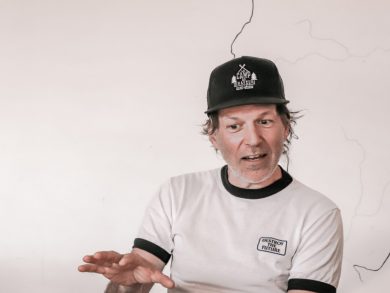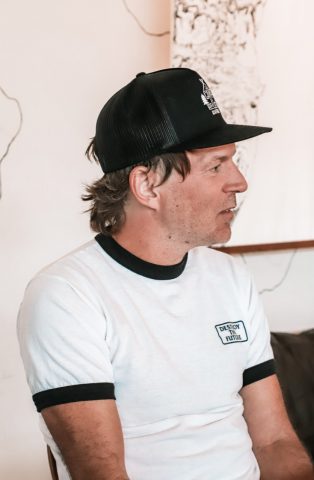“I know aficionados of microdoses,” sings Fred Fortin on the title song of his sixth album – the surprise launch of which, at 12:01 a.m. on Aug. 23, 2019, had remained a very well-kept secret until that moment. “Microdose was a surprise even for me,” says Fortin. “I wanted new material to bring on my solo tour.” What started as an EP ended up as a full album. When gathered together, those songs, lying in the bottoms of drawers, seemed to go with his new ideas, and resonated like a rough and dirty melody, both current and directly linked to his start… more than 20 years ago.

Fortin has delivered an album, of which half the songs are with Joe Grass, and the other half with Olivier Langevin, and all of it recorded with Pierre Girard. “We wanted it to be spontaneous, rough and dirty,” he says “I had stuff to get off my chest after Ultramarr, which was a slightly more conventional album.”
His second album, Le plancher des vaches, is the one he feels is the closest to this one. “They share the same raw vibe,” says Fortin. “And there are several language levels. It’s complete nonsense. They’re manifestations of life, sometimes sad and sometimes happy. There’s all kinds of bipolar curves.”
“Microdose”
“There are eight songs on the album that were all done at the same time, including this one. I would swap guitars to find inspiration. I recently worked with Diane Tell. That led to me having a lot of fun with bossa nova-type rhythms. It reminded me of bands from the West Coast of the U.S. All those cool, hip people. I started making fun, in good faith, of San Francisco, and people who are too cool. Joe Grass plays on this one, and he said to me with his Anglo accent, “I know what this needs. Flute, this needs flute.” He knows EriK Hove. We called him and he played the flute. I don’t know how that guy sees me now. I really like this music. I wanted to involve the zeitgeist, the microdose, the idea of doing things little by little, that’s what it’s all about. The Mile-End [neighburhood] is Montréal’s San Francisco. I like it, but you can also make fun of it.”
“Électricité”
“I considered offering that one to Diane Tell. But my girlfriend and Langevin didn’t want to let go of it. It’s the story of a violent character. I like going to extreme psychological zones. I also very much like characters who don’t have control over what’s going on. When you talk about killing someone, it’s OK in the movies, but when you toy around with that type of fiction in a song, you need to provide a tremendous amount of context in three minutes. I’ve re-appropriated this right to be trashy after Ultramarr, which was a little tamer.”
“Led Zeppeline”
“I added an ‘e’ at the end to avoid any confusion. The analogy varies, according to the verses. There’s a kid’s squabble, like those we’ve experienced during my kid’s teens. My youngest is 14, and he wasn’t too warm on the idea of being featured in the song, but he thought it was super-funny, in the end. I wanted to tell a family story.”
“Cracher en l’air”
“That one also came out of my studio blitz. It’s about someone I’m close to who told me how tough it was. I tell it as if it was happening to me. Jealousy and resentment are feelings that can be hard to express. It’s hard music, but in a different way. It’s a heavier emotional level, and you can hear it in the music. It’s up to everyone to create their own image. The guitar is also heavier on that one. I recorded the guitar and drums first. I was on a tangent of writing about people I’m close to, so the rest all came to me super-easily.”
 “King Size”
“King Size”
“I write this for someone else’s album. If you pay close attention, you’ll hear it on another album, but with slight variations. The people around me really wanted me to keep it, so I changed a whole section of chords in the middle when I recorded the other one. My girlfriend, Langevin, and Pierre Girard really liked the melody. They’re my three wives. They decide.”
“Crocodile”
“That’s an old draft from before Ultramarr. I don’t know why I didn’t keep it. The recording dates back to 2014. I probably figured I had enough smooth tracks on the album. It’s very ‘bare bones.’ I love playing slower, less heavy dynamics. The whole album is all over the map like that.”
“Cave”
“The story is funny. The opening sentence sent me on a tangent. It’s from a Galaxie show. We were playing the Sea Shack, in Gaspésie. Alexis Dumais was touring with us as a keyboardist. It was Halloween and all of us were in costume. Alexis was wearing a Passe-Montagne costume [a character from an immensely popular TV show for 0 to six-year-olds from the ’70s and ’80s on Télé-Québec]. He ended up on the beach, in his costume, at 4:00 a.m. When he got in the van the next day, he was still wearing it. We stopped at Tim Hortons, and he kept it on. He told us: ‘I should swing by my parents in Rimouski, and tell them, ‘Don’t worry, I’m really not well.’ I kept that line. I love being like a vampire with my friends in that way. I thought the image was too good not to use.”
“Wendy”
“I got the idea for this one while I was walking up the hill to talk on the phone at my cabin. I actually got the idea on my way back down. The reception is pretty bad at the bottom (laughs). I wanted a horny free pass to defuse the rest.”
“Cuite”
“Now that’s an old one! It’s from in between Gros Mené and the rest of my stuff. I had done a version with a real drum, but I decided to do it over as a one-man band.”
“Redneck”
“That’s also from the big batch. I’m a bit of a redneck, in a certain way. It’s part of the North American mentality. We’re all slightly rednecks, in our own way. I exaggerated the attitude in order to make a story out of it. I got Mononc’ Serge on to blast the world. But there’s also a conqueror element à la Éric Lapointe, I think.”
“Zéro-trois-quart”
“That’s gravel: zero three quarters of an inch. I picked up this old console and I was trying it out at home, while I was having a load of zero three quarters delivered in my yard. Ideally, you have to listen to this one while walking barefoot in gravel. ‘You dream of getting a good run under a grader to wipe off all of your scars.’ I thought the image was nice.”
“Bocal”
“That’s an old one. It was a commission I got for an artist who really didn’t like it (laughs). Anique Granger used it on her album. I really liked the melody.”
To listen to or purchase Fred Fortin’s Microdose, click here.